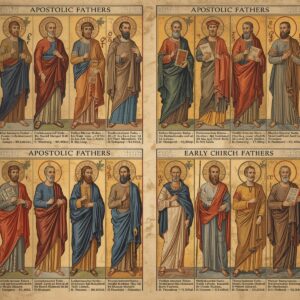Beyond the Fish Stickers: Finding the Heartbeat of Real Faith
You’ve seen the bumper stickers. Heard the debates. Maybe you sat in a pew growing up, smelled, and sang the hymnals.
Perhaps Christianity feels like a distant cultural echo, woven into holidays and traditions, but not touching your core.
We see the word “Christian” gets thrown around a lot, but what does it even mean? And how do we tell the difference between genuine faith and something that looks the part?
Today, let’s talk honestly about this journey of faith, stripping away the jargon and getting to the heart of the matter.
Types of Christianity

First, it’s important to understand that Christianity isn’t a monolith. It’s more like a sprawling, vibrant family tree with deep roots and many branches, all tracing back to Jesus Christ.
The main trunks you’ll encounter in Christianity are:
- Catholicism: Emphasizes tradition, the authority of the Pope (as successor to St. Peter), and sacraments as channels of God’s grace. It’s ancient, liturgical, and globally diverse.
- Eastern Orthodoxy: Shares ancient roots with Catholicism but distinct in theology and practice (like not recognizing the Pope’s universal authority). Rich in liturgy, icons, and mystical tradition.
- Protestantism: Born from the Reformation (think Martin Luther and John Calvin), emphasizing salvation by faith alone (Sola Fide), the authority of Scripture alone (Sola Scriptura), and the priesthood of all believers.
- This branch itself has countless denominations:
- Lutheran: Focus on grace and the sacraments.
- Reformed/Presbyterian: Emphasis on God’s sovereignty and covenant theology.
- Anglican/Episcopalian: A “middle way” with Catholic liturgy and Protestant theology.
- Baptist: Stressing believers’ baptism by immersion and local church autonomy.
- Methodist: Known for emphasis on personal holiness, social justice, and practical faith.
- Pentecostal/Charismatic: Highlighting the active work of the Holy Spirit, including gifts like speaking in tongues and healing.
- Non-denominational: Often focusing on a direct, Bible-based approach outside traditional structures.
- This branch itself has countless denominations:
Other Common Names/Titles for Variations of Christianity Practiced Today
Beyond Cultural Christianity, several other distinct emphases or distortions exist:
- Prosperity Gospel (or “Health and Wealth Gospel”):
- Core Idea: God wants believers to be physically healthy, materially wealthy, and personally successful in this life as a sign of His favor and their faith. Faith is often presented as a force to manipulate God’s blessings, and giving to the ministry is emphasized as a key to unlocking prosperity.
- Contrast with True Christianity: Shifts focus from the cross and eternal salvation to earthly wealth and comfort. Often distorts God’s character into a divine vending machine, downplays suffering and sacrifice, and can lead to victim-blaming (e.g., poverty/sickness = lack of faith). Emphasizes material gain over spiritual transformation and sacrificial giving.
- Moralistic Therapeutic Deism (MTD): This is less an organized movement and more the de facto belief system absorbed from culture by many, including those within church walls. A common underlying belief system within Cultural Christianity: Moralistic: Being good/nice is the primary goal. God exists mainly to reward good people. Therapeutic: God’s main job is to help me feel happy and fulfilled and solve my problems. Deism: God is distant, like a watchmaker who set things in motion but isn’t personally involved unless called upon for help. Sadly, many Christians fall into this category.
- Liberal Christianity / Theological Liberalism:
- Core Idea: Emphasizes ethics, social justice, and personal spiritual experience while downplaying or rejecting core supernatural doctrines (e.g., the Virgin Birth, physical Resurrection, miracles, biblical inerrancy, substitutionary atonement). Scripture is often viewed through a primarily historical/critical lens, with cultural context seen as overriding divine authority on disputed issues.
- Contrast with True Christianity: Replaces the authority of Scripture and core apostolic doctrines with human reason, experience, and contemporary cultural values as the ultimate authority. The unique saving work of Christ is often minimized or redefined.
- Nominal Christianity: Similar to Cultural Christianity, this simply means “Christian in name only.” It implies an identification without any real practice, belief, or commitment.







